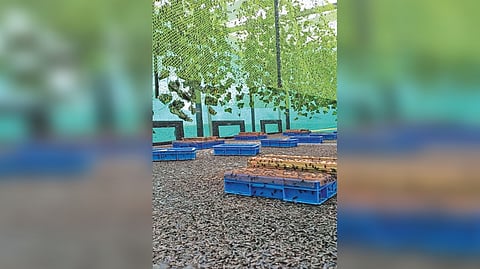

VELLORE: The Vellore Corporation, already a leader at the national level in solid waste management, has created a record by being the first local body in the country to opt for entomo composting where the larva of a special type of fly from TN forests is used to convert wet waste to fertilizer, according to Corporation Commissioner P Ashok Kumar.
Revealing this to DT Next, he said, “experimental trials on for the last one year has resulted in the larva consuming wet waste and producing 2 tonnes of fertilizer. We plan to increase this to 5 tonnes in another three months.” These flies are fed with wet waste during the most important larval stage and their droppings become the fertilizer, he added.
However, the entomo composting trial is a joint venture in the PPP (public private partnership) mode with Ensect Farm private limited. According to Anup TV of Ensect Farm, “We use Hermetia illucens also known as the black soldier fly. The adult does not eat, but survives on energy stored during the larval stage. It is not a pest. It has no mouth and does not transmit any disease. It is found in tropical and sub-tropical climates globally.”
Explaining, he said, “It has a maximum life of seven days with the female dying after laying eggs. Its only nutrition is water. The insect increases its body mass by more than 10,000 times in 12 days and also neutralizes pathogenic bacteria like Salmonella and E.coli.”
The first culture was received from the central government’s ICAR’s (Indian Council for Agricultural Research) NBAIR (National Bureau of Agricultural Insect Resources) in Bengaluru, he added.
Compared to regular processing, this method takes only 10–12 days as against the 45 days for microbial composting. Space wise this method can process 4 times more material than normal composting in the same space,” Anup said and added that the final product called insect frass is the fertilizer.
The Vellore Corporation has sent the samples to both TNAU and VIT universities to find out which crops are best suited for this fertilizer, Ashok Kumar added.
Visit news.dtnext.in to explore our interactive epaper!
Download the DT Next app for more exciting features!
Click here for iOS
Click here for Android